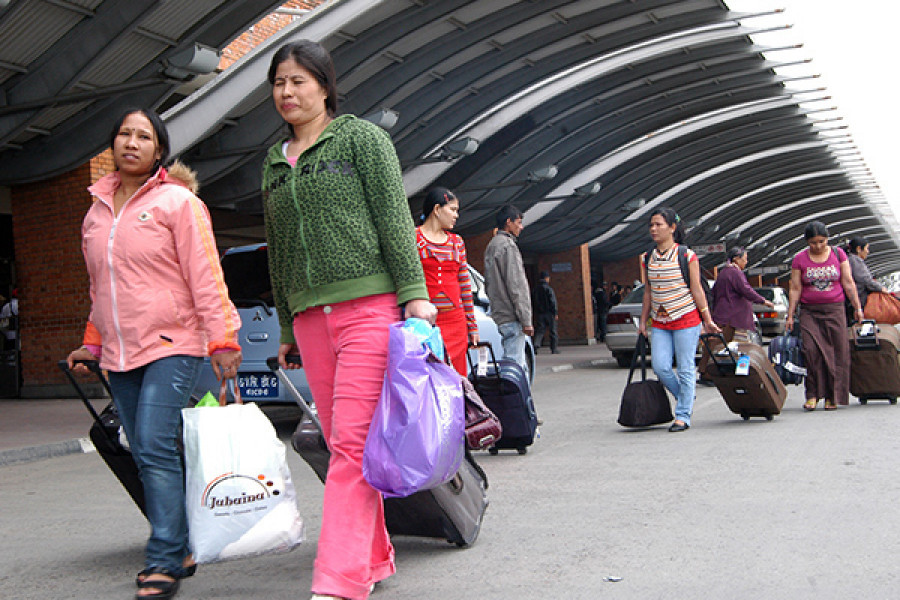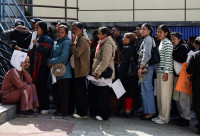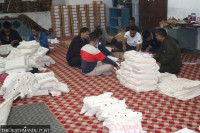National
Experts slam government on restrictive approach on governing women’s mobility
The government imposing bans on women from migrating instead of making labour migration safer for them only infringes on their rights to mobility and employment, they say.
Chandan Kumar Mandal
Under the guise of protecting women from potential abuses during labour migration, the government has failed to respect women’s right to mobility by imposing several restrictions in the last two decades, according to women rights activists.
During a virtual interaction, proponents of women’s freedom of movement and labour migration experts came heavily on the government for failing to protect women’s right to movement and employment under various pretexts.
According to Rameshwar Nepal, a labour migration researcher, the state has over the years failed to respect, protect and fulfil women’s freedom to movement, which has been enshrined in national and international laws.
“On March 5, 1998, the Nepal government added some more rules on existing laws to restrict women from migrating on foreign employment,” said Nepal, executive director at Equidem Research Nepal, a human rights research organisation. “Since then, the state has imposed restrictions on the women’s movement by imposing partial and blanket bans based on age-limit, country-wise ban, job-wise ban, and even job sector wise ban. While imposing all these bans, Nepal has failed to show its responsibility in protecting women’s right to mobility.”
Over the years, the Nepal government has come up with several restrictions which disproportionately affect women migrant workers and infringe on their right to movement and seek employment opportunities.
In the existing restrictions, which has been enforced since 2017, following a visit of parliamentarians to destination countries, Nepalis are banned from taking housemaid jobs in the Persian Gulf countries.
“The parliamentary committee submitted its report with several recommendations for the labour migration sector. The government agencies did not implement other recommendations but rushed to ban women from migrating for domestic jobs,” said Nepal. “Government officials defend the decision saying the ban was for all, not only women, but it is evident most of the women are going for such jobs, hence the ban affects women more.”
However, the protectionist approach of the government has been criticised for not only curtailing the rights of women but also failing to protect women from potential abuses at home and abroad.
“Nepali women are compelled to migrate due to social, political and economical factors. The constitution has guaranteed their right to work and freely move. But the same rights have been curtailed again and again in the last two decades on various pretexts,” said Neha Choudhary, national project coordinator at Integrated Programme on Fair Recruitment, ILO Nepal. “Such rules directly infringe on their fundamental rights and they are further victimised by the restrictive approach of the state.”
During the discussion, organised by ILO Nepal on Friday, experts pointed out that the ‘protectionist approach’ imposed by the government has done more harm to the same women whom the government has been trying to protect, forcing Nepalis girls and women to choose unsafe and illegal routes. Despite the ban in place, Nepali women have been reaching prohibited countries through agents, taking the risk of being trafficked and other abuses.
“Nepal is a source country for domestic workers. Most of these are women and aspirations for a better life lead them to migrate. The number has increased in the last decade,” said Shristi Kolakshyapati Pradhan, a programme coordinator at the Women’s Rehabilitation Centre. “In the same timeframe, the government has enforced several bans. Have these laws stopped them from migrating? They are still migrating. What such rules have done to them is making them unsafe although they have said they want to protect those women.”
In a recent instance of the government coming up with similar restrictive rules, the Department of Immigration had proposed a new rule for women under 40 going abroad on a visit visa. The proposed rule met with severe criticism as it was called out for discriminatory against women.
According to Binda Pandey, a member of parliament, the law-making process in the country still has some limitations and are often drafted without even consulting the key stakeholders.
“The centralised practice of lawmaking is still prevalent although the country has adopted a decentralised system. We say that we have progressive laws but their impact on the general public is not considered,” said Pandey. “The concerned ministry drafts the law, sends it to the law ministry for technical issues and then it is approved by the Cabinet. Only after the draft of the law is tabled in Parliament and makes several amendments the concerned committee discusses them with stakeholders.”
Also, only Kathmandu-based stakeholders and civil societies are consulted while drafting these laws, pointed out Pandey.
“If we are making laws for mainstreaming issues of marginalised communities, like women, and ensuring their rights, then they should be consulted during the law-making process,” said Pandey. “Only after incorporating their suggestions and consultations should laws be made.”
Experts called for the removal of any ban on women’s movement as such bans end up further victimising them. A parliamentary committee last October had decided to relax the ban on domestic jobs in the Persian Gulf countries. However, there was a list of conditions to be met.
According to Nepal, the labour migration expert, one of the conditions said Nepali migrant workers should be able to communicate in the language of the destination country.
“The Nepal government’s report has said that Nepali officials in labour destination countries can not communicate in local dialects, adding to problems in solving migrant’s issues. How can the same government expect marginalised women to speak foreign languages,” said Nepal. “There should be the removal of any restriction as they contradict with women’s fundamental human rights, constitutional rights and all the international laws Nepal is a party to. Such bans, which are nothing but gender-based discriminations, can not be accepted.”
Experts also blamed the government for resorting to the easier option of imposing bans than trying to fix the loopholes and make the labour migration sector safer and dignified for women as well.
“Women won’t be safe if they migrate is simply the wrong mentality. That’s not the reality,” said Nepal. “Countries like the Philippines, Indonesia, Sri Lanka have made it safer for their women migrants. There are challenges irrespective of gender and country of origins. We simply have not learnt from the practices of other labour sending countries.”




 20.9°C Kathmandu
20.9°C Kathmandu














